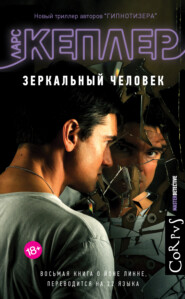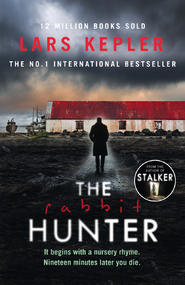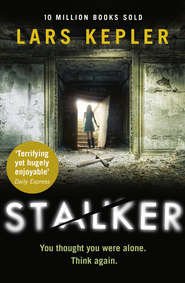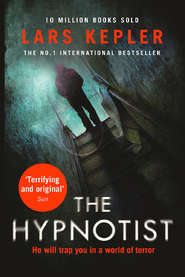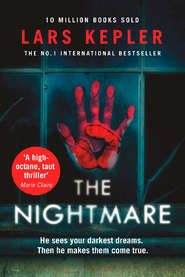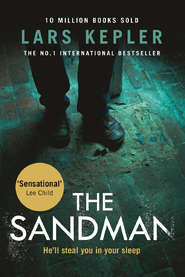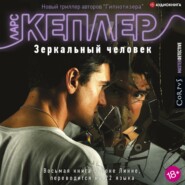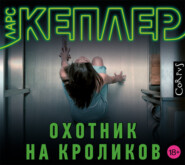По всем вопросам обращайтесь на: info@litportal.ru
(©) 2003-2024.
✖
The Fire Witness
Автор
Год написания книги
2019
Настройки чтения
Размер шрифта
Высота строк
Поля
‘Wait,’ she says, even though she tells herself it was just the wind again.
She hurries over and grabs the handle, but meets a peculiar resistance. There’s a brief tug-of-war before the door simply glides open.
Elisabet walks into the dining room, very warily, trying to scan the room with her eyes. The scratched table stands out in the darkness. She moves slowly towards the stove, sees her own movement reflected in its closed brass doors.
The flue is still radiating heat.
Suddenly there’s a crackling, knocking sound behind the stove doors. She takes a step back and bumps into a chair.
It’s only a piece of firewood falling against the inside of the doors. The room is completely empty.
She takes a deep breath and walks out of the dining room, closing the door behind her. She starts to head back towards the corridor where her overnight room is, but stops again and listens.
She can’t hear anything from the girls’ rooms. There’s an acrid smell in the air, metallic, almost. She looks for movement in the dark corridor, but everything is still. Even so, she is drawn in that direction, towards the row of unlocked doors. Some of them seem to be ajar, while others are closed.
On the right-hand side of the corridor are the bathrooms, and then an alcove containing the locked door to the isolation room where Miranda is sleeping.
The peephole in the door glints gently.
Elisabet stops and holds her breath. A high voice is whispering something in one of the rooms, but falls abruptly silent when Elisabet starts to move again.
‘Quiet, now,’ she says.
Her heart starts to beat harder when she hears a series of rapid thuds. It’s hard to localise them, but it sounds like Miranda is lying in bed kicking the wall with her bare feet. Elisabet is about to go and check on her through the peephole in the door when she sees that there’s someone standing in the alcove. There’s someone there.
She lets out a gasp and starts to back away, with a dream-like sense of wading through water.
She realises at once how dangerous the situation is, but fear makes her slow.
Only when the floor of the corridor creaks does the impulse to run for her life finally manifest itself.
The figure in the darkness suddenly moves very quickly.
She turns and starts to run, hearing footsteps behind her. She slips on the rag-rug, and knocks her shoulder against the wall, but keeps moving.
A soft voice is telling her to stop, but she doesn’t, she runs, almost throwing herself along the corridor.
Doors fly open then bounce back.
In panic she rushes past the registration room, using the walls for support. The poster of the UN Convention on the Rights of the Child falls to the floor. She reaches the front door, fumbles, and manages to open it, shoves the door open and runs out into the cool night air, but slips on the porch steps. One of her legs folds beneath her as she lands awkwardly on her hip. The stabbing pain from her ankle makes her yell out loud. She slumps to the ground, then hears heavy steps in the porch, and starts to crawl away. She loses her indoor shoes as she struggles to her feet with a whimper.
4 (#ulink_518b1a29-edce-57b4-a06a-ce64ac476514)
The dog is barking at her as it runs about, panting and moaning. Elisabet limps away from the house, across the dark driveway. The dog barks again, ragged and anxious. Elisabet knows she won’t be able to get through the forest – the nearest farm is half an hour’s drive away. There’s nowhere to go. She looks around in the darkness, then creeps behind the drying house. She reaches the old brew-house and opens the door with shaking hands, goes inside, and carefully closes the door.
Gasping, she sinks to the floor and tries to find her telephone.
‘Oh God, oh God …’
Elisabet’s hands are shaking so badly that she drops it on the floor. The back comes loose and the battery falls out. She starts to pick up the pieces as she hears footsteps crunching across the gravel.
She holds her breath.
Her pulse is thudding through her body. Her ears are roaring. She tries to look out through the low window.
The dog is barking right outside. Buster has followed her there. He’s scratching at the door and whimpering.
She crawls further into the corner next to the brick fireplace, and tries to breathe quietly, hiding right at the back next to the wood basket, as she pushes the battery back into her mobile.
Elisabet lets out a scream when the door to the brew-house opens. She tries to shuffle along the wall in panic, but there’s nowhere to go.
She sees a pair of boots, then the shadowy figure, and then the terrible face, and the hand holding the dark, heavy hammer.
She nods, listens to the voice, and covers her face.
The shadow hesitates, then rushes across the floor, holds her down on the floor with one foot, and strikes hard. There’s a flash of pain at the front of her head, just above her hairline. Her sight disappears completely. The pain is appalling, but she can still feel the warm blood running over her ears and down her neck like a soft caress.
The next blows hits the same place, her head lurches, and all she can feel is how air is being drawn down into her lungs.
Bewildered, she can’t help thinking that the air is wonderfully sweet, then she loses consciousness.
Elisabet doesn’t feel the rest of the blows and how they make her body flinch. She doesn’t notice the keys to the office and the isolation room being taken from her pocket, and she isn’t aware of being left on the floor, or how the dog slips into the brew-house and starts to lick the blood from her crushed head as life slowly leaves her.
5 (#ulink_66228b15-3686-51eb-9ae5-961308add687)
Someone’s left a big red apple on the table. It looks really lovely, all shiny. She decides to eat it and then pretend not to know anything about it. Ignore the questions and nagging, just sit there looking grumpy.
She reaches towards it, but when she’s got it in her hand she realises that it’s completely rotten.
Her fingers sink into the cold, wet flesh.
Nina Molander wakes up the moment she snatches her hand back. It’s the middle of the night. She’s lying in bed. The only sound is the dog barking out in the yard. Her new medication often wakes her at night, and she has to get up to pee. Her calves and feet have swollen up, but she needs the pills, otherwise her thoughts turn very dark and she stops caring about anything and just lies there with her eyes shut.
She feels she needs something bright, something to look forward to. Not just death, not just thinking about death.
Nina folds the covers back, sets her feet down on the warm wooden floor, and gets out of bed. She’s fifteen years old, and has straight blonde hair. She’s got a stocky build, with broad hips and big breasts. Her white flannel nightdress is stretched tight across her stomach.
The children’s home is quiet, and the corridor is lit up by the green sign for the emergency exit.
She can hear strange whispering behind one door, and Nina wonders if the other girls are having a party without bothering to ask if she’d like to join in.
I don’t want to anyway, she thinks.
There’s the smell of a burned-out fire in the air. The dog starts barking again. The floor in the corridor is colder. She doesn’t bother trying to be quiet. She feels like slamming the toilet door several times. She couldn’t care less about Almira getting angry and throwing things at her.
The old tiles creak gently. Nina carries on towards the toilets, but stops when she feels something wet under her right foot. A dark puddle is seeping out from under the door to the isolation room where Miranda is sleeping. At first Nina just stands still, unsure of what to do, but then she notices that the key is in the lock.
Very odd.






